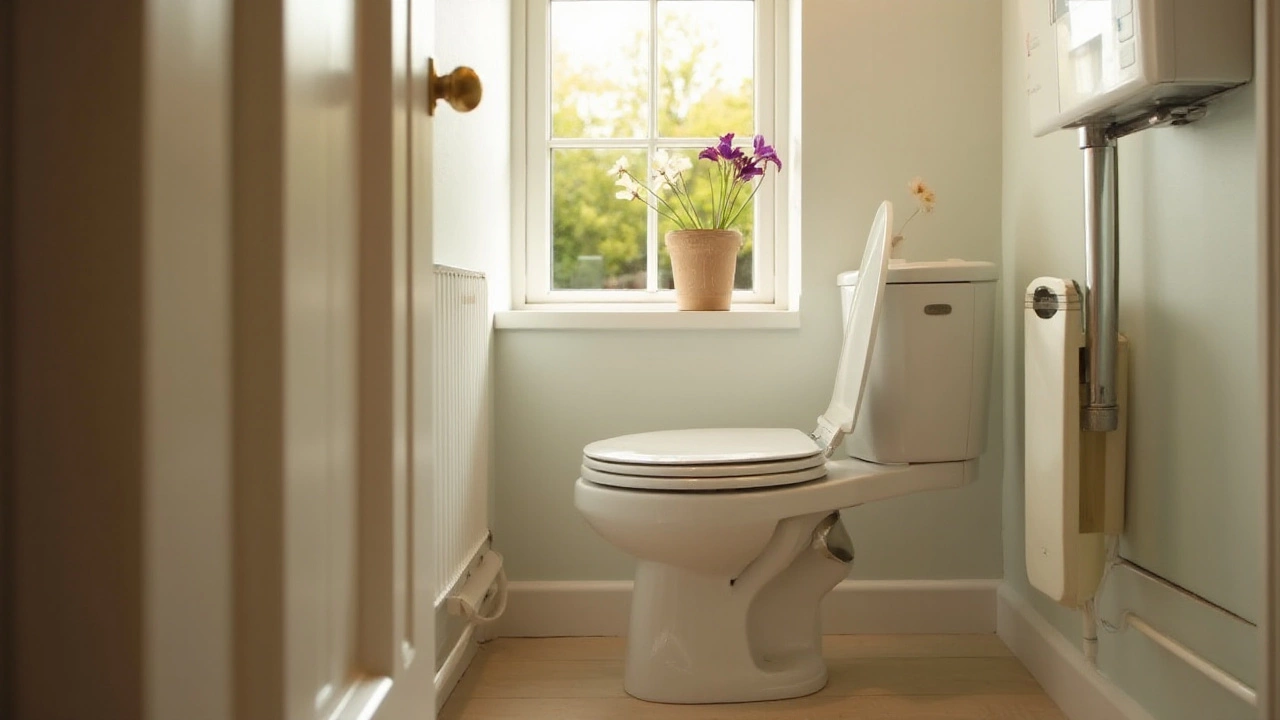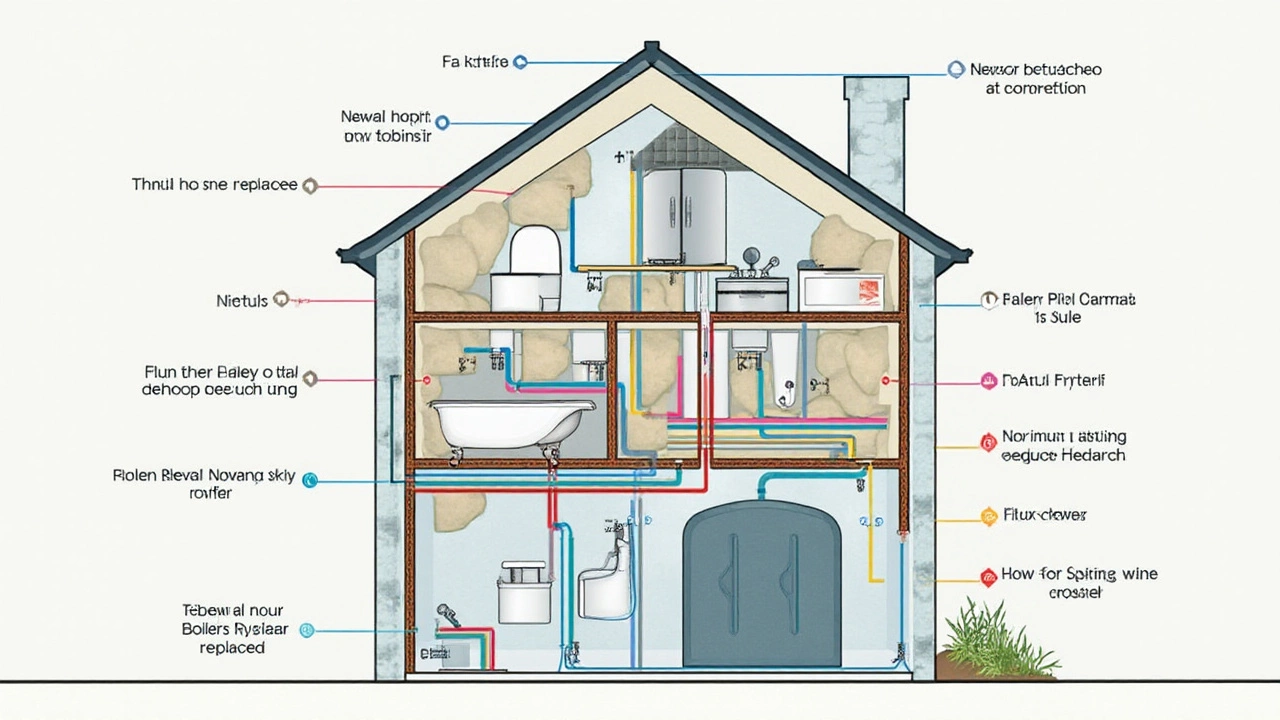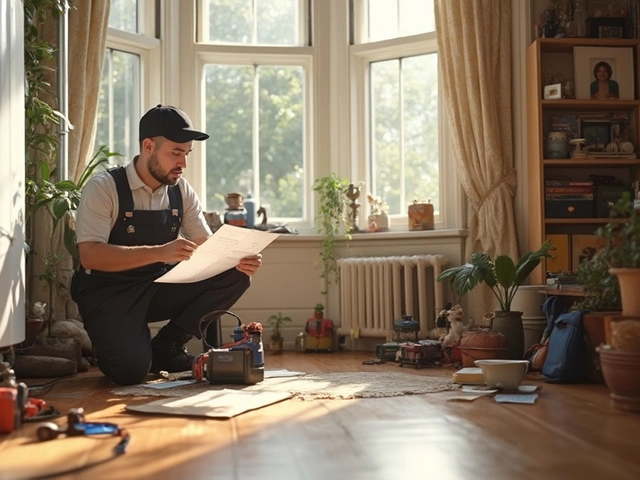Boilers are the hardworking heroes behind the scenes, keeping our homes warm and water hot. When it's time for a boiler replacement, it might provoke a slew of questions about daily routines, especially regarding bathroom use. While central heating systems are complex, understanding their impact on basic utilities can save a ton of stress.
Using the toilet during a boiler replacement often depends on how your plumbing is laid out. Many modern homes have systems designed to keep essential services like toilets separate from heating. Let's explore what you need to know to navigate this home improvement with ease and minimal disruption.
- The Role of the Boiler in Plumbing Systems
- How Boiler Replacement Affects Water Usage
- Practical Tips for Using the Toilet
- Addressing Common Misconceptions
- Ensuring Smooth Sailing with Plumbing Professionals
The Role of the Boiler in Plumbing Systems
In the vast array of home infrastructure, the boiler sits as a central player in maintaining comfort and functionality. Its primary task revolves around heating water, which it then dispatches through various networks in your home. This means that the boiler directly supplies hot water for everything from showers to taps, thus weaving itself into the fabric of daily life. Interestingly, the toilet, unlike many fixtures, typically uses cold water from a separate line. This means that while the boiler's efficiency is crucial, its overhaul may have less impact on toilet operations than one might expect.
The boiler's integration into plumbing begins with its connection to the hot water cylinder in systems that rely on stored hot water. These systems contrast with combi boilers, which heat water on demand and generally eliminate the need for a storage tank. This intricacy shows how the boiler's role changes with different system designs. Both systems, however, supply the radiators, ensuring your home stays toasty during those brisk winter months. During a boiler replacement, understanding these connections helps homeowners anticipate any temporary service disruptions.
Balancing technical roles, the boiler also indirectly influences the energy efficiency of your entire house. The UK, for example, attributes about 60% of household energy costs to boiler use. This effectiveness, or lack thereof, makes regular maintenance and timely replacements crucial. Older models might huff and puff while newer ones have sparkling efficiency ratings. Choosing the right boiler type not only secures ongoing comfort but also plays a part in reducing household energy consumption.
Some misconceptions do exist, like the idea that replacing a boiler always means household water outages. While true in some scenarios, plumbers often employ methods to bypass or temporarily replace functions, ensuring minimal downtime. Dr. Joanna York, a leading voice in sustainable home technologies, emphasizes in her work that "smart management and modern approaches allow boiler replacements to be less invasive."
"The real magic lies not only in the boiler's heating prowess but also in understanding and planning around the intertwined systems it supports," she notes.
With all its unassuming complexity, the boiler's role in plumbing highlights the need for a clear-eyed approach when repairs or replacements rear their heads. It’s recommended to consult extensively with professionals to understand which elements will continue to operate normally during this period. With clear communication and planning, replacing a boiler need not throw your household into upheaval. Instead, it can be an opportunity to reassess and optimize how energy circulates throughout your everyday life.
How Boiler Replacement Affects Water Usage
When it comes to replacing a boiler, understanding its impact on water usage is essential for smoothly managing household activities. The boiler plays a critical role in heating water that flows through your radiators and taps, but this doesn't mean all water usage stops during replacement. Typically, the primary function of the boiler is closed-loop: it heats water for central heating and, in some systems, hot water for domestic use—think showers and handwashing. However, the plumbing system in most homes is designed to allow cold water to bypass the boiler, ensuring that when you turn on the tap for a glass of water or to flush the toilet, the system remains unaffected.
While your daily showers might feel chilly without a functioning boiler, the cold-water supply should not be disrupted. Plumbing configurations can vary greatly, and older systems might offer less flexibility during a boiler change. It's reassuring to consider that contemporary plumbing methods often have separate circuits. Toilets, which rely solely on cold water from the main supply, generally remain operational. Therefore, concerns about needing to search for alternatives due to a temporary lack of hot water are usually unfounded. Understanding these dynamics can guide you in making informed decisions during your boiler's downtime.
In households where space heating and water heating are linked in more intricate ways, particularly in gravity-fed systems, the absence of a working boiler can indeed influence things like radiator function more directly. However, these systems are increasingly rare as homeowners turn to efficient combi-boilers or system boilers.
"Most modern homes are now fitted with combi boilers, which provide hot water on demand, reducing the need for extensive water storage systems,” says a report from the Energy Saving Trust.This technological switch not only boosts energy efficiency but also means that the impact of a non-operational boiler is less likely to extend to your home's water supply for toilets.
Diving a bit deeper, the replacement process may stem from issues like malfunctioning components, energy inefficiency, or simply the age of your current unit. Even with these reasons warranting a replacement, the core plumbing infrastructure to your toilet remains largely untouched. For those with dual boilers or setups combining multiple energy sources, including solar or electric heating elements, the continuity of water service becomes even more reliable. You might experience temporary alterations if your repair teams need to access specific pipes or if the layout of your infrastructure is exceptionally complex. Therefore, requesting detailed information from your service provider can be beneficial. Knowing when your boiler will be upgraded precisely helps manage the timing of essential tasks like baths or laundry, allowing one to plan around any brief interruptions in the heating supply.

Practical Tips for Using the Toilet
When your home's boiler is being replaced, it’s natural to wonder how this will impact basic day-to-day needs like using the toilet. Although the heating system seems like it shouldn’t affect toilet use, the two are more connected than one might initially think. Boilers are integral to the heating of water, and in some cases, the pressurization of the plumbing system, which can have a knock-on effect on other aspects of your home’s water usage. To navigate this period with minimal disruption, it helps to understand a few key points and plan accordingly.
A great first step is to consult with your plumber or the professional handling the boiler replacement about potential water interruptions. They can offer advice tailored to your home’s specific setup. In many cases, toilets can still function because they rely on cold water which remains unaffected, but there can be exceptions. It’s often advisable to fill a few buckets with water before the work begins. This simple preparation can allow you to flush your toilet manually if water supply is temporarily paused.
If your home's heating and plumbing systems are interconnected more intricately, another tip is to stagger your water use. Limit non-essential water usage in the hours leading up to the replacement to ensure your toilet's reservoir—or the cistern—remains full. It’s a practical move that grants a bit of leeway while technicians are at work. Moreover, having some bottled water on hand or in storage might also be beneficial, just in case unexpected delays arise.
Bryan Thwaites, a seasoned plumbing technician, notes, "Preparation is key. Informing the household of potential disruptions ensures everyone knows what to expect, and that takes a lot of pressure off both the residents and the technician."
In anticipation of water services being affected, establishing a backup plan is prudent. For those unfortunate enough to face a prolonged disruption, consider making arrangements with a neighbor or close friend for restroom use. In some cultures, community and cooperation extend into various aspects of life, including shared necessity-based resources. Alternatively, short-term solutions such as portable toilets can also offer a temporary convenience. These options, though unusual, ensure life continues unhindered, despite the appliance upheaval.
Lastly, it is wise to engage with the service professionals about the estimated duration of the replacement. This might help in scheduling bathroom breaks strategically around the work, especially if occupants have special needs or during busy times of the day. Communication reduces surprises and keeps everyone in the loop, mitigating stress during what often is a disruptive yet essential maintenance task. Remember, these adjustments are temporary, with normalcy soon to return when the boiler replacement wraps up.
Addressing Common Misconceptions
When it comes to boiler replacement, many homeowners are puzzled by how it might affect their everyday water usage, particularly in terms of using the toilet. The first misconception is that all water-related activities in the house will be off-limits. In reality, the ability to use your toilet during a boiler replacement largely hinges on the type of plumbing system your home employs. In most contemporary plumbing setups, the line supplying water to toilets is separate from those connected to the boilers. This means that these systems operate independently, allowing you to use the toilet as usual. This separation is designed to maintain essential activities even if the central heating system has to pause.
Another common assumption is that there's no hot water available throughout the house when the boiler is being swapped out, but this might not always be the case. If your property features an immersion heater or an electric shower, you might still access hot water during this period. These devices are standalone systems and don't rely on the boiler to heat water. Homeowners often think of their boiler as the sole provider of comfort in their daily lives, and that’s where misconceptions begin. Understanding your setup can alleviate unnecessary stress, making the boiler replacement process much smoother.
An amusing yet frequent myth floating around is that extra charges from the water utility could come about due to overuse when a boiler is out. It's important to note that while you may find yourself using more water out of habit - perhaps seeking extra baths instead of showers - the rates are not going to surge just because your heating system is undergoing maintenance. Water utilities base charges on long-term usage, not temporary spikes.
"The more informed homeowners are about their plumbing systems, the fewer disruptions they face." - Anonymous Plumbing Expert
Finally, some folks might believe that opting for a boiler replacement means a full-blown interruption from skilled laborers camped out in every room. However, modern professionalism in plumbing tips ensures minimized intrusion. Professionals typically work within the confines of the boiler room, sometimes needing access to other areas briefly and strategically, leaving you to go about your home routines relatively unimpeded. This knowledge underscores the importance of communicating with your service providers for a clear understanding of what to expect. Be sure to discuss their specific procedures, so you can structure your day accordingly and ease the transition with preemptive planning.

Ensuring Smooth Sailing with Plumbing Professionals
When faced with a boiler replacement, enlisting the help of skilled plumbing professionals can significantly ease the process. It's not just about swapping out one boiler for another; it's about ensuring that every part of your home's water and heating system works perfectly with the new installation. A knowledgeable plumber will take time to assess your current system, understanding how it interacts with your home's overall plumbing layout. Asking the right questions about potential disruptions can offer valuable peace of mind during the process.
Most modern plumbers aim to minimize inconvenience while maximizing efficiency, and good communication is key. Make sure to discuss your needs upfront, like whether you'll be needing access to water for specific times or any crucial events that might require special arrangements. Professionals in the field know all about balancing tasks efficiently. As warmer temperatures can lead to expanded metal in pipes and colder climates cause contractions, these subtle effects on plumbing might influence the timing of installations or repairs. Understanding these nuances with your professional will further help you navigate what might seem an intimidating home improvement task.
According to a survey by the Plumbing Manufacturers International, 98% of professional plumbers recommend conducting a thorough home water audit before any major plumbing changes such as a boiler replacement, to pre-empt any potential future issues.
Another important consideration during a boiler replacement is the availability of necessary components. Some older systems might require specific, now hard-to-find parts, meaning a potential delay. A well-prepared professional typically knows the ins and outs of sourcing these components quickly, but being aware of this possibility can help you stay patient and informed. Plumbing tips provided by professionals can assist in understanding these timeframes. Having a timeline in mind with contingency plans if anything changes will keep stress levels manageable.
In addition to standard procedures, it's worth discussing potential upgrades with your plumber. Enhancements like smart thermostats or more efficient heating solutions could be seamlessly integrated into your new system. These options, though potentially more expensive upfront, can save in energy costs over time. Typically, home repair scenarios such as these present ideal chances to explore energy-efficient upgrades, positioning your household for future savings.
Boiler repair professionals often have a plethora of experiences that they can share. These can range from amusing anecdotes to serious tips on avoiding plumbing pitfalls, both of which serve to enlighten and educate. Their dual insight into the boilermaking process and general plumbing can bridge any knowledge gaps that homeowners may have. By fostering an open dialogue with your plumber, you're not just resolving immediate issues but also learning ways to improve maintenance over the long haul.
Finally, it’s important to provide feedback after the work is done. Letting plumbing professionals know what worked and what didn’t can help them refine their services for future customers. Keeping a friendly and cooperative relationship ensures that ongoing plumbing concerns are handled with priority and care, making any future repairs or upgrades less daunting. These professionals are allies in maintaining comfortable and functional homes, so treating them as such promotes better service and outcomes.





